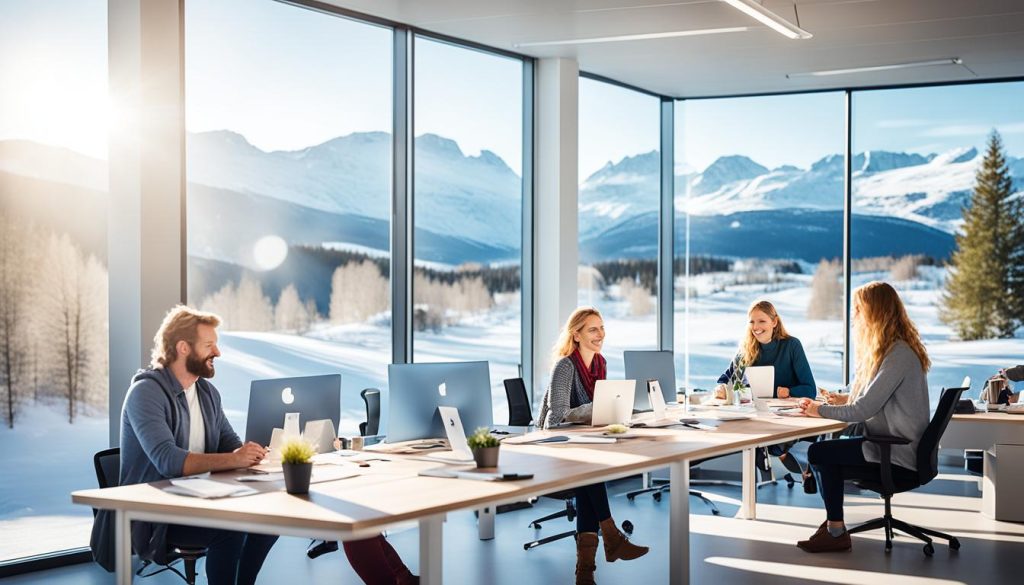The working cultures of Nordic countries stand out because they focus on efficiency, work-life balance, and well-being. These nations are known for their high living standards and forward-thinking policies. They provide great lessons on how to build a better work environment.
Key Takeaways:
- The Nordic working cultures prioritize work-life balance, promoting employee well-being and satisfaction.
- Embracing diversity and inclusion is crucial for business prosperity. Companies that support diversity tend to be more successful.
- Settling into Nordic working cultures might be hard at first for newcomers. The societies may seem less friendly at the beginning.
- Nordic working environments fight stereotypes by welcoming all and encouraging open-mindedness.
- The Nordic region’s open approach to diversity helps businesses make better decisions, which leads to financial success.
The Importance of Diversity and Inclusion
Diversity and inclusion are key for a thriving, successful business. Studies by McKinsey reveal several benefits. Businesses focusing on gender diversity show a 21% chance of being more profitable than others. And those celebrating different ethnicities have a 33% better chance of financial success.
These results stress the importance of welcoming all in the workplace. When companies include people of various genders, ethnicities, and cultures, they gain unique insights. This mix of ideas boosts innovation, problem-solving, and decisions.
Moreover, such a diverse and inclusive setup leads to happier employees. Feeling valued and respected makes them more committed. As a result, work quality improves, and staff turnover decreases. This cycle leads to a more profitable business.
Also, diverse employees help understand a variety of customer needs. They reflect the wide customer base a company may have. This connection boosts customer satisfaction and loyalty.
To sum up, diversity and inclusion pave the way for success. They drive innovation and enhance employee satisfaction. Plus, they help better understand and serve customers. A work environment filled with diverse experiences is enriching for all and profitable for businesses.
Friendliness and Settling In Challenges
Settling into Nordic working cultures might be a bit tough at first, especially when it comes to feeling welcome. These countries are sometimes seen as not very friendly. A survey showed Denmark as the 5th worst for newcomers feeling welcome. Sweden, Finland, and Norway were also in the bottom 10 for friendliness. This shows there could be some obstacles for people starting a new job in these places.
The difference in culture and reserved behaviour is a big part of this. In Nordic countries, it can take some time and effort to feel at home. Nordic people aren’t as open to strangers as some others might be. Yet, they are not being rude or unfriendly. It’s more about their cultural style of being a bit reserved at first.
Once you overcome these initial hurdles and build relationships, things can change a lot. Nordic folks really treasure realness in their friendships. Making true friends might take time, but when it happens, the bonds can be very strong and lasting. Also, in big cities or international offices, there’s often a vibe that’s more open to newcomers.
To get through the initial challenges, being proactive and open-minded is key. It’s good to engage with your colleagues, show interest in their culture, and join in social events. This can be the first step in making connections. Also, learning a bit of the local language, even if it’s just some basic words, shows you’re trying to fit in. By being involved and truly interested, you can start to feel more like you belong in your new work environment.
| Nordic Country | Ranking for Feeling Welcome |
|---|---|
| Denmark | 5th worst |
| Sweden | Bottom 10 |
| Finland | Bottom 10 |
| Norway | Bottom 10 |
Breaking Stereotypes in Nordic Working Cultures
The Nordic working cultures offer a special chance to fight stereotypes. They help build a place where everyone feels part of the team. To do this, keeping an open mind is key whether you’re new or have been there a long time.
Being open-minded helps us meet new people and see things in a different light. This leads to more teamwork and less misunderstanding between colleagues of different cultures. By breaking down stereotypes, Nordics show how to welcome everyone.
Impact of Attitude on Work
Our attitude at work is key to how well we do. What we choose and go through affects our attitude. This, in turn, shapes how we work and mingle with others. Being open to different people and ideas is vital for doing well in business.
A study by McKinsey found a link between being diverse and making more money. Companies with different kinds of people are almost 30% more likely to be successful. This shows how diversity boosts financial growth.
Having a mix of backgrounds in a team is not only the right thing to do; it’s also clever. It lets different ideas and skills come together, sparking new ways of thinking. This can help companies reach more people and make their customers happier and more loyal.
A workplace that celebrates everyone makes people feel appreciated. Here, people are more likely to enjoy their jobs. This leads to better teamwork, fewer people leaving, and everyone working better.
To have an inclusive attitude, we must show care and listen to others. We need to be open to new ideas and treat everyone fairly. By welcoming diversity, businesses can do more and reach higher. This way, everyone wins.
Embracing Outsiders and Insiders
Creating a more inclusive workplace needs both outsiders and insiders to take part. Outsiders, who might be new to the job or area, should reach out to insiders. They can do this by making connections and getting involved in local activities. Understanding local ways helps them become part of the team.
Insiders, on the other hand, already belong to the group. They should welcome diversity. This means listening to what outsiders have to say and appreciating their unique backgrounds. By doing this, the workplace becomes a place where all are respected.
Together, outsiders and insiders can make the workplace welcoming to all. Outsiders bring in new ideas and viewpoints. Insiders offer support and wisdom. This partnership creates a vibrant and diverse work environment. It benefits not just the workers, but the entire company.
The Role of Businesses in Promoting Inclusion
Businesses play a key role in making our world more diverse and connected. This is especially true in Nordic countries. There, by hiring people from different walks of life, companies can become both more inclusive and creative. This act of welcoming outsiders brings a variety of new ideas to the table.
To be truly inclusive, companies need to change how they think and act. They must fight against their own biases and search for diverse talent. This commitment helps create a workplace where everyone is welcomed. People from different backgrounds feel they belong and can share their unique views.
This inclusivity isn’t just nice-to-have; it also makes businesses thrive. Studies show that teams with a mix of people will often outdo those with everyone the same. Such teams bring more ideas to solve problems and can be quite innovative. Besides, companies that value diversity tend to attract the best minds. This puts them ahead in the competitive world of business.
To ensure everyone thrives, businesses should put in place certain practices. This can be anything from mentorship programs to help reduce unconscious biases to offering flexible work options. Fair promotion chances are also crucial. These steps help create a work environment where all employees feel they have a fair shot at success.
Benefits of Inclusion and Diversity in Businesses
Choosing to focus on inclusion and diversity can bring a host of advantages:
- Embracing inclusion and diversity in businesses brings numerous benefits
- Enhanced creativity and innovation
- Improved problem-solving and decision-making
- Increased employee engagement and job satisfaction
- Greater adaptability and resilience
- Expanded market reach and customer base
- Enhanced reputation and brand image
| Statistic | Impact of Inclusion and Diversity |
|---|---|
| Companies in the top percentile for gender diversity are 21% more likely to perform higher than the norm in terms of profitability. | Increase in profitability |
| Companies excelling in high ethnicity diversity have a 33% higher chance of financial success. | Higher likelihood of financial success |
| Diverse teams are more likely to outperform homogeneous teams in terms of problem-solving and innovation. | Enhanced problem-solving and innovation |
| Businesses that promote diversity and inclusion have a better reputation, attract top talent, and retain employees. | Improved talent attraction and retention |
Scandinavian Working Culture: Work-Life Balance
The Scandinavian working culture focusses a lot on work-life balance. It aims to keep employees happy and healthy. In Nordic countries, it’s common to see a good mix between work life and personal life.
Nordic companies value family time, hobbies, and self-care. This is different from places where people often work a lot and get burnt out. They believe that a happy worker is a productive worker.
Nordic companies also let their employees adjust their hours. This helps fit personal tasks into the day. They also have long family leave and a lot of holidays. This way, workers can take breaks and spend time with their families.
But it’s not just about time off. Nordic work culture is supportive. They care about their employees’ mental health and stress. This creates a positive work environment where people are happy.
In summary, work-life balance is key in the Scandinavian workplace. It helps reduce stress and keeps people mentally well. This approach benefits both employees and the companies they work for.
Trust and Autonomy in the Workplace
In Nordic working environments, trust and autonomy are key. They greatly boost how well employees do and how successful the company is. Trust means workers can do their jobs without someone always watching over them.
This helps them think freely and do more. Also, many companies in Scandinavia have simple structures with no strict hierarchies. This makes sharing and talking openly easier, leading to better team work.
Gender Equality in the Workplace
In Nordic working cultures, gender equality is key. Women often hold leadership roles. There is much respect for women in these workplaces. This makes the environment diverse and welcoming for everyone.
Having both men and women in leadership improves many things. Companies do better financially and in coming up with new ideas. They solve problems more effectively. And their workers are happier.
Iceland stands out in gender equality. It’s been number one for more than ten years globally. Companies there are winning the battle against the gender pay gap. They’re giving more women the chance to lead.
Giving women and men the same chances is the goal at Nordic companies. It means supporting everyone’s career growth equally. They also fight against unfair stereotypes and biases. Their aim is to end all forms of gender discrimination and make their workplaces fair.
Nordic businesses are leading the way in equality worldwide. They prove that treating everyone fairly makes a company stronger. They show the global community that fairness and success can go hand in hand.
Sustainability in Nordic Working Cultures
In Nordic work settings, sustainability is key. Companies there focus on protecting the environment and caring for society. They aim for a planet that thrives forever.
One big goal is to cut down on carbon emissions. They do this by using less energy and by choosing green energy sources. This effort to pollute less helps the Earth and proves their love for sustainable life.
In the Nordics, businesses love clean energy. They use sources like wind, sun, and water to power up. By doing this, they help battle climate change and dream of a nature-friendly tomorrow.
They also care a lot about making less waste. These companies try not to waste and recycle a lot. This helps them be green and shows they work hard to keep the Earth clean.
For the Nordics, saving the planet is also about people’s lives. They work closely with their towns, back local projects, and care about what happens around them. This way, they help the whole community and show how much they care.
Sustainability Initiatives in Nordic Companies
In the Nordic regions, companies take big steps for sustainability. They:
- Invest in projects for green energy to use less oil and gas.
- Use smart technology at work to save energy.
- Focus on reusing products and making less trash.
- Help with community projects and solve social problems.
- Educate their staff on how to be more green.
All these efforts make the Nordics a place where good work and nature go hand in hand.
Lessons from Nordic Working Cultures
Nordic working cultures offer insights for companies worldwide. They focus on work-life balance, trust, autonomy, gender equality, and sustainability. These elements combine to create a great working space that boosts both happiness and success.
Work-Life Balance: A Priority
Nordic cultures highlight the need for a healthy work-life balance. They understand that personal time is important for everyone. This approach lowers stress and boosts mental health. As a result, employees are both happier and work more efficiently.
A Foundation of Trust and Autonomy
Trust and autonomy are the backbone of work in the Nordic regions. Employers let their staff work freely without constant checks. This freedom drives creativity and efficiency. With a flat management style, teamwork and collaboration thrive effectively.
Promoting Gender Equality and Diversity
Nordic countries believe strongly in gender equality and diverse workplaces. They have many women in leadership roles and respect all employees equally. By valuing diversity, they welcome new ideas and drive innovation.
A Commitment to Sustainability
In the Nordics, being green is a big deal. Companies there focus on using less energy, renewable power, and producing less waste. Their eco-friendly efforts help the planet and inspire others to follow their lead. These steps match the values of the people in the region.
Taking cues from Nordic work styles can change companies for the better around the world. By valuing balance, trusting employees, supporting equality and diversity, and caring for the planet, success can flourish. Employees feel happier and more fulfilled, leading to better overall results.
Shorter Work Days and Workweeks
Nordic countries are known for valuing shorter workdays. This sets them apart from many others. Employees get more time for personal interests. They can balance work and life well. This makes people happier and more satisfied.
Some think working longer hours means doing more. But Nordic countries prove this wrong. Even with a short workday, they remain highly productive. This shows they care about smart working. It means people finish their jobs well in a shorter time.
In the Nordics, shorter workdays are a big deal. They show employers there care about their workers’ rest and personal time. This approach boosts both physical and mental health. It also lifts up creativity and job passion.
At heart, Nordic’s shorter workdays value life beside work. They prove you can be successful without losing out on personal time.
Generous Parental Leave and Subsidized Child Care
In Nordic countries, work-family balance is highly valued. They offer generous parental leave and child care support. These efforts help parents manage their jobs while spending great time with their kids.
Parents can take time off to be with their newborns under parental leave. This helps everyone get used to parenting. It especially boosts how well parents and kids bond. It also helps dads get more involved, boosting equality at home.
Child care help is big in the Nordics too. It means parents can count on good care as they go back to work. This includes support for places like daycares and preschools, where children not only get looked after but also learn and grow.
These policies don’t just help families. They make employees happier and more productive. Work is less stressful, leaving room for parents to focus better. And better work leads to happier employees overall.
Benefits of Generous Parental Leave and Subsidized Child Care:
- Promotes work-family balance
- Strengthens parent-child relationships
- Fosters gender equality
- Supports child’s development through high-quality care
- Reduces parental stress and enhances employee well-being
The Nordics show a strong dedication to helping families at work. This is good for both employees and the companies they work for. It makes for places where everyone is supported and feels part of a big team.
| Benefits of Generous Parental Leave and Subsidized Child Care |
|---|
| Promotes work-family balance |
| Strengthens parent-child relationships |
| Fosters gender equality |
| Supports child’s development through high-quality care |
| Reduces parental stress and enhances employee well-being |
Embracing Hygge and Remote Work
Nordic cultures love hygge. It makes the workplace feel warm and friendly. Originating from Denmark, hygge is all about comfort, warmth, and togetherness. It helps colleagues get along, feel good, and work in a happy place.
Remote work is also big in Scandinavia, bringing flexibility and balance. With modern tech, people can work when and where they like. This might be at home, a café, or in nature. It means everyone can work where they feel best.
Working remotely also boosts job happiness and productivity. By skipping the commute and working in a cosy spot, distractions are less. This lets workers put more effort into their tasks and stay motivated.
The COVID-19 pandemic showed how vital remote work can be. It keeps businesses running safely. Plus, it makes switching between home and office working easy. This keeps business running smoothly.
The Advantages of Hygge and Remote Work
People and companies can benefit from hygge and remote work. Here’s how:
- Enhanced well-being: Hygge and remote work both reduce stress and boost happiness. Working from a spot you choose can make you more content and mentally well.
- Improved work-life balance: Remote work lets you fit work around your life. This is great for family time or hobbies. It helps you feel refreshed when not working.
- Increased productivity: Without office distractions, you can focus better. Remote workers often get more done. This comes from being able to work in peace.
- Talent attraction and retention: Young professionals love the freedom that hygge and remote work bring. It means they’re more likely to stay with a company they enjoy working for.
- Cost savings: Companies save on office expenses. Workers save on travel costs. It’s a win-win for everyone’s wallet.
A Comparison of Hygge and Remote Work
Now, let’s compare hygge and remote work closely:
| Hygge | Remote Work |
|---|---|
| Promotes a cozy and inclusive work environment | Allows for personalized and comfortable workspace |
| Fosters positive relationships and teamwork | Enables effective collaboration through digital tools |
| Focuses on well-being and stress reduction | Provides flexibility for better work-life balance |
| Encourages creativity and innovation | Enhances productivity and efficiency |
| Promotes a sense of community and togetherness | Offers autonomy and self-management |
Hygge and remote work could change how we work for the better. They put happiness, health, and freedom first. This makes for a great place to work and helps companies keep their best people.
Conclusion
Nordic working cultures stand out for several reasons. They combine great work-life balance, trust, gender equality, and a passion for sustainability. These factors help build a welcoming atmosphere at work. This supports the happiness, health, and success of employees. Global companies can gain a lot from Nordic work values.
The Nordics value a good work-life balance. They aim to help staff keep a healthy mix of work and home life. This lowers stress and boosts mental health for workers.
Nordic work places are big on trust and freedom too. They encourage employees to be creative and work well together. These places are equal for all and often have women in power. Plus, they deeply care about the planet and social issues.
So, Nordic work cultures inspire others to create positive work spaces. They show how focusing on balance, trust, gender equality, and being eco-friendly can benefit everyone. Following these ideas can make a company a better, happier place to be.













